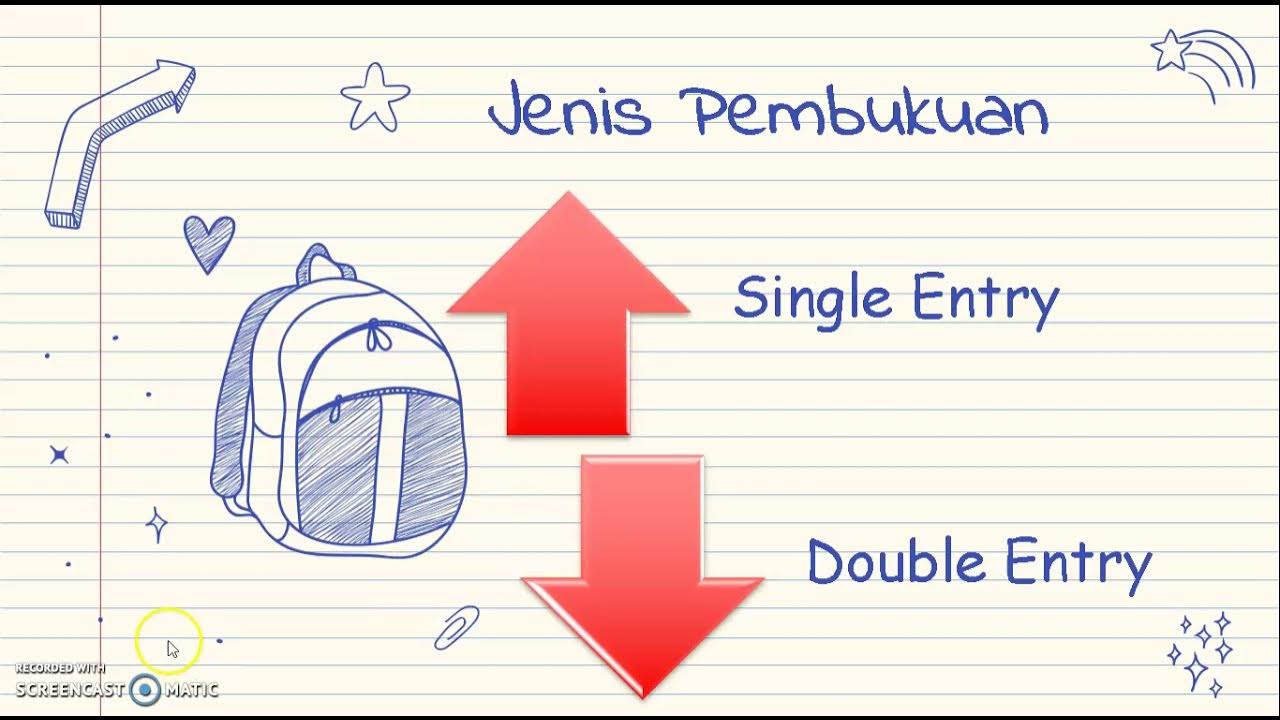Pembukuan & Pencatatan | MOOC | Materi Pengantar Perpajakan Seri 8
Summary
TLDRThis video explains the key differences between 'pembukuan' (bookkeeping) and 'pencatatan' (recording) in the context of Indonesian tax law. Bookkeeping involves systematic financial data collection, used to prepare balance sheets and income statements, while recording focuses on tracking income and tax obligations. The video outlines the requirements for both practices, such as maintaining accurate, documented records, the use of foreign languages and currencies in specific situations, and storage regulations for records. It also discusses conditions for changing fiscal years and methods, along with rules for small business tax calculation.
Takeaways
- 😀 Bookkeeping ('Pembukuan') involves systematic recording of financial data including assets, liabilities, income, expenses, and transaction details, which are essential for preparing financial reports like balance sheets and profit-loss statements for tax purposes.
- 😀 Recording ('Pencatatan') is a simpler form of data collection used to track gross income, taxable and non-taxable income, and the calculation of taxes owed, primarily for individual taxpayers who don't need to maintain full bookkeeping.
- 😀 Taxpayers required to maintain bookkeeping include individual business owners, freelancers, and corporate entities (business entities).
- 😀 Individual taxpayers who are not conducting business or freelancing can use recording as an alternative to bookkeeping.
- 😀 Bookkeeping must be conducted with good faith, accurately reflecting the actual business activities and must comply with certain legal requirements in Indonesia, such as using the Latin alphabet, Arabic numbers, and the Rupiah currency.
- 😀 Bookkeeping reports must include details about assets, liabilities, capital, income, and expenses, as well as sales and purchases, to ensure proper financial reporting for tax purposes.
- 😀 There are specific rules for modifying the bookkeeping method, such as changes in the fiscal year, asset depreciation, inventory valuation, and income and expense recognition, which must be approved by the Directorate General of Taxes (DGT).
- 😀 The use of foreign languages and currencies in bookkeeping requires approval from the Ministry of Finance (Kemenkeu) and is only permitted for certain types of taxpayers, including foreign investment companies and businesses listed on foreign stock exchanges.
- 😀 Recording must be done systematically and chronologically, in the Indonesian language and Rupiah, and must be supported by relevant documents for tax calculation. Records should be kept for at least 10 years.
- 😀 Taxpayers must store their bookkeeping and recording documents for a minimum of 10 years in Indonesia, either in physical form or electronically, and the storage must occur at the place of business or residence for individuals and at the company’s registered office for corporate entities.
Q & A
What is the main difference between 'pembukuan' (bookkeeping) and 'pencatatan' (recording)?
-The main difference is that bookkeeping is a systematic process of recording financial data to prepare financial reports, such as balance sheets and profit-and-loss statements, while recording is the collection of data used to calculate tax obligations based on gross income and other financial details.
Who is required to carry out 'pembukuan' (bookkeeping)?
-Bookkeeping is required for tax purposes by individual taxpayers who engage in business activities or work freely, and also by corporate taxpayers.
Who is allowed to use 'pencatatan' (recording) instead of bookkeeping?
-Recording can be used by individual taxpayers who are allowed to use MPN (Net Income Calculation Norms) or are not engaged in business activities or free professions.
What are the main requirements for bookkeeping according to Indonesian law?
-The main requirements for bookkeeping include reflecting real business activities, being conducted in Indonesia, using Latin script, Arabic numerals, and Rupiah currency, following accrual accounting, and including basic records on assets, liabilities, income, and expenses.
What does 'pencatatan' (recording) entail for tax calculation?
-Recording involves systematically collecting data about gross revenue, non-taxable income, and final-taxable income, which is then used as the basis for calculating the amount of tax owed.
What is the minimum duration for storing financial records under Indonesian tax law?
-Financial records must be stored for a minimum of 10 years, as required by Indonesian tax law.
What are the rules for changing fiscal years or bookkeeping methods?
-Changes in fiscal years or bookkeeping methods require approval from the tax authorities and must be submitted before the start of the new fiscal year with a valid reason for the change.
Can a taxpayer use foreign currency and foreign language for bookkeeping and recording?
-Yes, taxpayers who are involved in international investments or certain types of businesses, such as those listed on foreign stock exchanges, may use foreign currency and foreign language for bookkeeping and recording, with prior approval from the Ministry of Finance (Kemenkeu).
What are the basic records that must be included in bookkeeping?
-Basic records in bookkeeping must include information on assets, liabilities, equity, income, expenses, and details on sales and purchases.
What are the key requirements for the proper implementation of 'pencatatan' (recording)?
-Recording must be done systematically, chronologically, and in alignment with the Indonesian language and Rupiah currency. It must also be based on cash flow data and supported by valid documents.
Outlines

This section is available to paid users only. Please upgrade to access this part.
Upgrade NowMindmap

This section is available to paid users only. Please upgrade to access this part.
Upgrade NowKeywords

This section is available to paid users only. Please upgrade to access this part.
Upgrade NowHighlights

This section is available to paid users only. Please upgrade to access this part.
Upgrade NowTranscripts

This section is available to paid users only. Please upgrade to access this part.
Upgrade NowBrowse More Related Video

AKUNTANSI PAJAK - PEMBUKUAN DAN PENCATATAN

BAB 2. PEMBUKUAN DAN PENCATATAN – PEMERIKSAAN PAJAK - FATIMAH ALIYSYA ALAYDRUS

Akuntansi Pemerintah SMK Kelas XI - Jenis Pembukuan Tunggal dan Berpasangan Akuntansi Daerah

ONLINE CLASSES| INTER 1ST YEAR MEC AND CEC\(ACCOUNTING) UNIT-1 BOOK KEEPING & ACCOUNTING IMPORTANT

KUP (Update 2023) - 1. Alur Kewajiban Perpajakan di Indonesia

Subjek & Objek Pajak | MOOC | Materi Pengantar Perpajakan Seri 6
5.0 / 5 (0 votes)